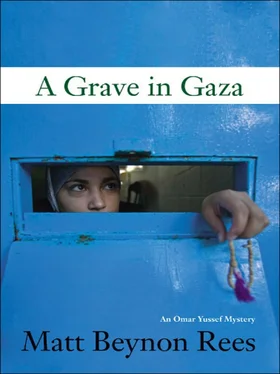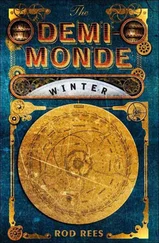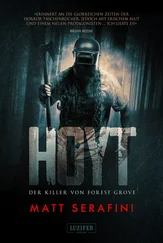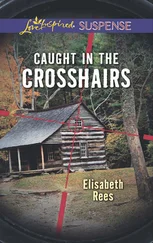Matt Rees - A grave in Gaza
Здесь есть возможность читать онлайн «Matt Rees - A grave in Gaza» весь текст электронной книги совершенно бесплатно (целиком полную версию без сокращений). В некоторых случаях можно слушать аудио, скачать через торрент в формате fb2 и присутствует краткое содержание. Жанр: Криминальный детектив, на английском языке. Описание произведения, (предисловие) а так же отзывы посетителей доступны на портале библиотеки ЛибКат.
- Название:A grave in Gaza
- Автор:
- Жанр:
- Год:неизвестен
- ISBN:нет данных
- Рейтинг книги:5 / 5. Голосов: 1
-
Избранное:Добавить в избранное
- Отзывы:
-
Ваша оценка:
- 100
- 1
- 2
- 3
- 4
- 5
A grave in Gaza: краткое содержание, описание и аннотация
Предлагаем к чтению аннотацию, описание, краткое содержание или предисловие (зависит от того, что написал сам автор книги «A grave in Gaza»). Если вы не нашли необходимую информацию о книге — напишите в комментариях, мы постараемся отыскать её.
A grave in Gaza — читать онлайн бесплатно полную книгу (весь текст) целиком
Ниже представлен текст книги, разбитый по страницам. Система сохранения места последней прочитанной страницы, позволяет с удобством читать онлайн бесплатно книгу «A grave in Gaza», без необходимости каждый раз заново искать на чём Вы остановились. Поставьте закладку, и сможете в любой момент перейти на страницу, на которой закончили чтение.
Интервал:
Закладка:
Cree nodded. “Look at the dates on the graves. See this fellow? He died in April 1917. But that one in the next row passed away in November.”
“The battles were here in this village?”
“By the time they established this cemetery in March of 1917, the fighting had moved north to Gaza City. If you died in action, they’d bury you more or less where you fell. But the wounded came to the Deir el-Balah field hospital and, if they didn’t survive, they buried them here.”
Omar Yussef scanned the wide lawn. “How many are there?”
“Seven hundred and fifty graves. Some of them over in that corner are Indians. There’re seven Jewish soldiers here, too. But most of them are just pale, pasty, old-fashioned Brits like me.” Cree looked at Omar Yussef and frowned. “Christ, can you imagine growing up in Britain, where it’s gray and wet and bloody cold but at least it’s home, and finding yourself forced to fight to the death for this alien, weird piece of land?”
“Unfortunately, James, there’s always been someone fighting for this stretch of land. Usually with no real knowledge of it or claim to it. The Jews were here millennia ago and the Arabs have been here more than a thousand years, but everyone else who fought for this place was a stranger, drawn by greed or hatred or God. The Crusaders, Napoleon, the Turks, all were alien to this place.”
Cree walked slowly along the line of graves. Omar Yussef looked at his watch. It was one o’clock. He wanted to get the information he needed in Rafah and be back in Gaza City before darkness closed in; he didn’t fancy taking the Saladin Road through the dust cloud in even worse visibility with Cree driving the way he was. He followed Cree’s steps impatiently, wondering if the Scot was stalling, trying to walk off his night of drinking and his concussion before he had to continue the drive.
Cree knelt in front of one of the graves. Omar Yussef came to his shoulder and read the inscription: Private James Cree. 4 Battalion Queen’s Edinburgh Rifles. 21 years. 5/11/17.
“My great-grandfather. I was named after him. Married, got his wife pregnant with my Grandpa Billy, off to war. Not much of a life, eh?”
“How did he die?”
“Don’t know. The records on private soldiers were kept in London and they were mostly destroyed by German bombs during the Second World War. There really is nothing left of his life.”
“Except your name.”
“Aye, there’s that.” Cree’s eyes had been red from the dust in the air and the blow to his face, but now the thought of his great-grandfather burned them. He wiped a tear with his knuckle and sniffed. “This land means something to me, Abu Ramiz. I owe it to my great-grandfather that those who live in Gaza shouldn’t die by the kind of violence that must have claimed his life. And the lives of the Turks who fought against him.” He smiled with one side of his mouth.
Omar Yussef put his hand to his chin. The drive to Rafah could wait a little longer.
“I went into the army when I was a young man,” Cree said. “The Edinburgh Rifles had been amalgamated into the Royal Scots, so I joined them. I thought that would make me closer to him.”
“Not too close, thankfully.”
“As far as I know, no one specifically tried to kill me.” Cree smiled, absently. “Thank God, I never had to kill anyone, either. Anyhow, because I knew so little about this fellow under our feet, I built a conversation in my head with the man I thought he’d have been. He told me that I was going about it all wrong. He was a conscript. He didn’t choose a life in uniform, and he didn’t want to fight. I left the army and went to work with the United Nations. I knew I’d see people at their worst, but I hoped I’d see them sometimes at their best.”
“How did it turn out?”
“I’ll let you know after we find Magnus.”
Omar Yussef put his hand on the top of the gravestone. It was roughened to the consistency of sandpaper by ninety years of dust storms like the one that whipped into the hedge now. “Man’s inhumanity to man makes countless thousands mourn,” he said.
“ Man Was Made To Mourn. Robbie Burns. I thought you were just a history man, Abu Ramiz.”
“Sometimes the things historians ought to say are said better by writers of literature.”
The two men held each others gaze, firmly. Cree nodded and stood. He glanced toward the eastern side of the graveyard. He noticed the damaged headstones and the disturbed earth that Omar Yussef had seen as they entered.
“What happened here?” he said.
“Vandals came a few nights ago,” the caretaker said. “I didn’t hear them, Mister Cree, because I was asleep. They entered through the hedge over there in the corner farthest from my house. They dug up the grass around a couple of the graves and broke some of the headstones.”
“Has this happened before?” Omar Yussef said.
“Never. But people are very angry about the British army’s part in the occupation of Iraq. They pasted some leaflets on the gravestones and they marked one of them with paint, with vicious comments.”
Omar Yussef walked to the vandalized section of the cemetery. The turf over a few of the graves had been lifted away, as though its lushness was an offense against the arid tombs of Gaza’s Palestinian dead, and the earth beneath had been strewn around. Three of the stones had been smashed in half. The caretaker had balanced the remains of the headstones on the shattered stumps. Next to the broken stones, cheaply printed copies of newspaper photos were pasted onto three other headstones. The photos showed a British soldier urinating on an Iraqi prisoner. Omar Yussef had read about the photo, after it turned out that it was a fake. The dead of this graveyard were paying for the phony scoop.
“I haven’t taken the posters off yet, because I’m waiting for advice on a way to do it without damaging the stone,” the caretaker said. He scratched his neck, nervously. “This one had a slogan painted on it. I used turpentine to take it off, but I think it may have damaged the stone, so I decided to seek expert advice before I try to fix the others.”
Omar Yussef glanced at the single stone that had been daubed in paint. “It’s not damaged, Suleiman. The stones were all a little dirty. When you cleaned this one, you thought you’d stained it. In fact, you took away the layers of ingrained dirt. It’ll look just as it always did, once the sun and wind have weathered it for a year or two.”
“Thank you, ustaz. I was quite worried. The dead have slept here for so many years, I feel as though these people who desecrated the graves wanted to kill them a second time.”
“Fortunately, that’s not possible.”
The caretaker gave Omar Yussef a doubtful glance. The man feels close to these dead foreigners, guarding them and tending to them as he does, Omar Yussef thought. He feels the injustice of this desecration very deeply.
“Still, it’s very upsetting,” Omar Yussef said. He put his hand on the caretaker’s shoulder and received a grateful look.
Cree went alone toward his namesake’s grave again. He ran a hand along the face of it, tracing the name where it was carved into the stone. He stood and moved purposefully toward the entrance. As he passed Omar Yussef, his eyes were clear and tough and his stride was firm. “Thanks for stopping with me, Abu Ramiz. I had to gather myself. I’m ready to go on now.”
Omar Yussef stepped onto the path, away from the disturbed turf and the vandalized graves. He bent to flick the dirt from his loafers with his handkerchief. He looked around the graveyard as he straightened, stretching his stiff back. He remembered Nadia’s story about the god Atum, whose weeping made mankind. Man was made to mourn all right. The only way to dry Atum’s tears was for them to turn to dust.
Читать дальшеИнтервал:
Закладка:
Похожие книги на «A grave in Gaza»
Представляем Вашему вниманию похожие книги на «A grave in Gaza» списком для выбора. Мы отобрали схожую по названию и смыслу литературу в надежде предоставить читателям больше вариантов отыскать новые, интересные, ещё непрочитанные произведения.
Обсуждение, отзывы о книге «A grave in Gaza» и просто собственные мнения читателей. Оставьте ваши комментарии, напишите, что Вы думаете о произведении, его смысле или главных героях. Укажите что конкретно понравилось, а что нет, и почему Вы так считаете.












